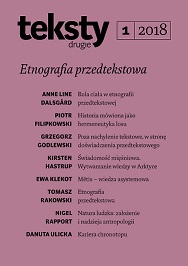Mētis – wiedza asystemowa
Mētis - A Systematic Knowledge
Author(s): Ewa KlekotSubject(s): Anthropology, Epistemology, Social Philosophy
Published by: Instytut Badań Literackich Polskiej Akademii Nauk
Keywords: ethnography; bodily knowledge; situated knowledge; research through practice; nondiscursivity;
Summary/Abstract: Given the intellectual legacy of the Aristotelian distinction and hierarchization between practical and theoretical knowledge and the Cartesian dualism in the Western cognitive tradition, the non-discursive knowledge of the body has not raised much interest in modern science and philosophy. From the perspective of ethnography as research through practice, however, the role that the body’s non-discursive knowledge plays in anthropological understanding takes on immense significance. Linking the practical experience of working on a potter’s wheel with Lambros Malafouris’s theory of material engagement, Klekot attempts to integrate non-discursive knowledge of the body into ethnographical cognition. Following Detienne Vernant, the non-discursive knowledge of the body is described with the Greek term mētis. It is positioned in the context of discursive strategies from outside the mainstream of Western knowledge, which Foucault describes as ‘subjugated knowledges’. From the perspective of a universalizing cognitive system such as the Western science, mētis, which is situated and which resists abstraction, turns out to be a kind of knowledge that is asystematic.
Journal: Teksty Drugie
- Issue Year: 2018
- Issue No: 1
- Page Range: 79-90
- Page Count: 12
- Language: Polish
- Content File-PDF

